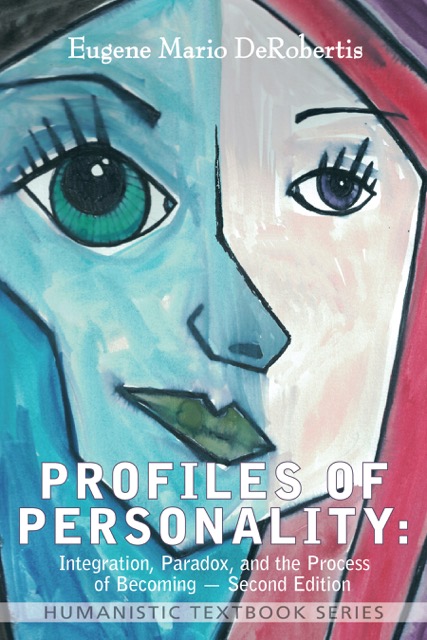 University Professors Press is excited to announce the release of Profiles of Personality: Integration, Paradox, and the Process of Becoming (2nd edition) by Eugene DeRobertis. Part of our Humanistic Textbook Series, this book is designed to be a supplemental textbook for Theories of Personality courses. It could also be used as a primary text supplemented with journal articles and other original sources. You can receive a 10% discount on Profiles of Personality through July 31, 2021 by clicking on this link or using this coupon code at checkout: PoPnr_7093.
University Professors Press is excited to announce the release of Profiles of Personality: Integration, Paradox, and the Process of Becoming (2nd edition) by Eugene DeRobertis. Part of our Humanistic Textbook Series, this book is designed to be a supplemental textbook for Theories of Personality courses. It could also be used as a primary text supplemented with journal articles and other original sources. You can receive a 10% discount on Profiles of Personality through July 31, 2021 by clicking on this link or using this coupon code at checkout: PoPnr_7093.
About Profiles of Personality (2nd Edition)
Profiles of Personality offers a refreshingly different approach to learning personality. Designed to serve as a primary or supplementary textbook for courses on personality theory, Profiles of Personality gently guides the reader to go beyond learning about the theories of personality to encouraging critical thought about them. Drawing on many years of teaching experience, DeRobertis writes in an accessible, engaging manner that keeps the reader engaged. The second edition of this text has been expanded and updated with over 100 pages of new content.
Personality textbooks come in two forms, each with their own style of organizing content. They will either be organized in terms of historical affiliation (e.g., Freud and those theories that are historically affiliated with Freud, etc.) or they will offer a series of disparate research foci. Both approaches make it difficult for students to attain a coherent, synoptic grasp of the subject matter. Profiles of Personality offers an alternative. It presents personality theories on the basis of a meta-narrative that guides the student through an unfolding story of personality and personal becoming. The meta-narrative of the text reflects the whole person emphasis that gave rise to the study of personality in the first place. As Walter Mischel once noted, the study of personality was intended to become the meta-discipline for integrating the findings and general principles of psychology as a whole as they speak to the person as a whole.
In contrast to the most contemporary texts take a more restrictive approach, the current text returns to the macro-integrative orientation of those early 20th Century personality theorists who helped to bring about the emerging humanistic revolution in psychology. The macro-integrative orientation has always been guided by the deeply held belief that the personality psychologist should not conflate objectivity with the objectification of the person or the personality. The aim of the approach is to be theoretically open, inclusive, and capable of speaking to the fullness of human existence, its drama, far beyond the aims of adaptation to given biosocial conditions. Macro-integrative investigations target the full range of human experience, from highly conflicted forms of pathology to highly self-transcendent forms of personal fulfillment.
Beginning with the contributions of the micro-integrative tradition, Profiles of Personality moves progressively deeper into the world of macro-integrative theorizing, increasingly exposing the role of paradox in the differential-integrative process of personality formation. Highlights of this new edition include brief discussions of gerotranscendence, gender, and education, additions to the analysis of narrative, and an expanded section on multiculturalism and the ecopsychological culture of place.
What People Are Saying About Profiles of Personality (2nd edition)
Profiles of Personality is one of the most thoughtfully organized and rhetorically compelling personality textbooks available. Returning to personality as a study of (whole) persons, it foregrounds integration of theoretical approaches towards an unfolding understanding of life as lived, in keeping with the most important tenet of humanistic psychology. Coverage of the theories is clear and informed, blending the best of old and new ideas. The text’s clear structure and engaging narrative make it highly valuable for face-to-face discussion and online learning environments alike. It will help students grasp difficult concepts in personality psychology, engage critical thinking, and develop lifelong tools for self-understanding and more insightful interactions with others.
Lisa M. Osbeck, PhD
Professor of Psychology, University of West Georgia
Past-President, APA Division 1 (Society for General Psychology)
In light of new discoveries in neuroscience, the plasticity of the brain confirms a view of the human personality as fluid and dynamic. Most theories of personality are stuck in old views of the brain and human nature, but Eugene DeRobertis gives us a holistic and dynamic perspective on personality that is congruent with these new discoveries. In this book, his passion for the wonder and mystery of the human personality comes through, as does his clearly stated desire to convey that passion to an emerging generation of psychology students and practitioners.
Ilene A. Serlin, PhD, founder and director of Union Street Health Associates and the Arts Medicine Program at California Pacific MedicalCenter, editor of Whole Person Healthcare (3 volumes)
This is an excellent book. It is scholarly yet written in a highly interesting and accessible style. It is the kind of book that I can recommend to my students and colleagues.
David N. Elkins, PhD, Professor Emeritus of Psychology, Graduate School of Education and Psychology, Pepperdine University, author of Humanistic Psychology: A Clinical Manifesto
This is a delightful introduction to personality theories through the lens of humanistic psychology. I am sure you will enjoy it as much as I do.
Louise Sundararajan, PhD
Fellow of APA and past president of Society for Humanistic Psychology (Division 32, APA)